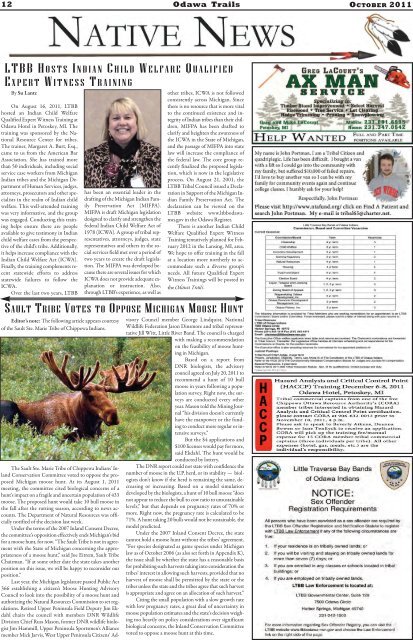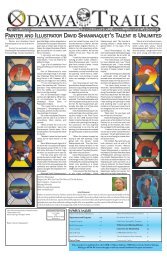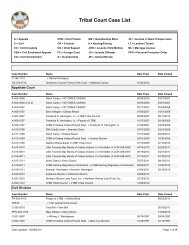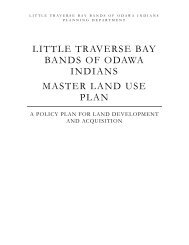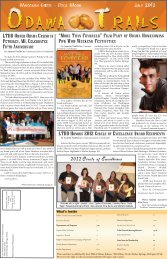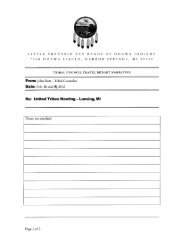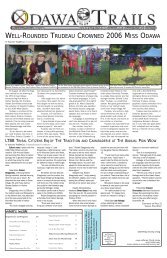October - Little Traverse Bay Bands of Odawa Indians
October - Little Traverse Bay Bands of Odawa Indians
October - Little Traverse Bay Bands of Odawa Indians
You also want an ePaper? Increase the reach of your titles
YUMPU automatically turns print PDFs into web optimized ePapers that Google loves.
12<br />
LTBB HOSTS I NDIAN C HILD W ELFARE Q UALIFIED<br />
E XPERT W ITNESS T RAINING<br />
By Su Lantz<br />
On August 16, 2011, LTBB<br />
hosted an Indian Child Welfare<br />
Qualified Expert Witness Training at<br />
<strong>Odawa</strong> Hotel in Petoskey, MI. The<br />
training was sponsored by the National<br />
Resource Center for tribes.<br />
The trainer, Margaret A. Burt, Esq.,<br />
came to us from the American Bar<br />
Association. She has trained more<br />
than 50 individuals, including social<br />
service case workers from Michigan<br />
Indian tribes and the Michigan Department<br />
<strong>of</strong> Human Services, judges,<br />
attorneys, prosecutors and other specialists<br />
in the realm <strong>of</strong> Indian child<br />
welfare. This well-attended training<br />
was very informative, and the group<br />
was engaged. Conducting this training<br />
helps ensure there are people<br />
available to give testimony in Indian<br />
child welfare cases from the perspective<br />
<strong>of</strong> the child’s tribe. Additionally,<br />
it helps increase compliance with the<br />
Indian Child Welfare Act (ICWA).<br />
Finally, the training complements recent<br />
statewide efforts to address<br />
statewide failures to follow the<br />
ICWA.<br />
Over the last two years, LTBB<br />
has been an essential leader in the<br />
drafting <strong>of</strong> the Michigan Indian Family<br />
Preservation Act (MIFPA).<br />
MIFPA is draft Michigan legislation<br />
designed to clarify and strengthen the<br />
federal Indian Child Welfare Act <strong>of</strong><br />
1978 (ICWA). A group <strong>of</strong> tribal representatives,<br />
attorneys, judges, state<br />
representatives and others in the social<br />
services field met over a period <strong>of</strong><br />
two years to create the draft legislation.<br />
The MIFPA was developed because<br />
there are several issues for which<br />
ICWA does not provide adequate explanation<br />
or instruction. Also,<br />
through LTBB’s experience, as well as<br />
<strong>Odawa</strong> Trails OCTOBER 2011<br />
other tribes, ICWA is not followed<br />
consistently across Michigan. Since<br />
there is no resource that is more vital<br />
to the continued existence and integrity<br />
<strong>of</strong> Indian tribes than their children,<br />
MIFPA has been drafted to<br />
clarify and heighten the awareness <strong>of</strong><br />
the ICWA in the State <strong>of</strong> Michigan,<br />
and the passage <strong>of</strong> MIFPA into state<br />
law will increase the compliance <strong>of</strong><br />
the federal law. The core group recently<br />
finalized the proposed legislation,<br />
which is now in the legislative<br />
process. On August 21, 2001, the<br />
LTBB Tribal Council issued a Declaration<br />
in Support <strong>of</strong> the Michigan Indian<br />
Family Preservation Act. The<br />
declaration can be viewed on the<br />
LTBB website www.ltbbodawansn.gov<br />
in the <strong>Odawa</strong> Register.<br />
There is another Indian Child<br />
Welfare Qualified Expert Witness<br />
Training tentatively planned for February<br />
2012 in the Lansing, MI, area.<br />
We hope to <strong>of</strong>fer training in the fall<br />
at a location more northerly to accommodate<br />
such a diverse group’s<br />
needs. All future Qualified Expert<br />
Witness Trainings will be posted in<br />
the <strong>Odawa</strong> Trails.<br />
SAULT TRIBE VOTES TO OPPOSE MICHIGAN MOOSE HUNT<br />
Editor’s note: The following article appears courtesy<br />
<strong>of</strong> the Sault Ste. Marie Tribe <strong>of</strong> Chippewa <strong>Indians</strong>.<br />
The Sault Ste. Marie Tribe <strong>of</strong> Chippewa <strong>Indians</strong>’ Inland<br />
Conservation Committee voted to oppose the proposed<br />
Michigan moose hunt. At its August 1, 2011<br />
meeting, the committee cited biological concerns <strong>of</strong> a<br />
hunt’s impact on a fragile and uncertain population <strong>of</strong> 433<br />
moose. The proposed hunt would take 10 bull moose in<br />
the fall after the rutting season, according to news accounts.<br />
The Department <strong>of</strong> Natural Resources was <strong>of</strong>ficially<br />
notified <strong>of</strong> the decision last week.<br />
Under the terms <strong>of</strong> the 2007 Inland Consent Decree,<br />
the committee’s opposition effectively ends Michigan’s bid<br />
for a moose hunt, for now. “The Sault Tribe is not in agreement<br />
with the State <strong>of</strong> Michigan concerning the appropriateness<br />
<strong>of</strong> a moose hunt,” said Joe Eitrem, Sault Tribe<br />
Chairman. “If at some other date the state takes another<br />
position on this issue, we will be happy to reconsider our<br />
position.”<br />
Last year, the Michigan legislature passed Public Act<br />
366 establishing a citizen’s Moose Hunting Advisory<br />
Council to look into the possibility <strong>of</strong> a moose hunt and<br />
authorizing the Natural Resources Commission to set regulations.<br />
Retired Upper Peninsula Field Deputy Jim Ekdahl<br />
chairs the council with members DNR Wildlife<br />
Division Chief Russ Mason, former DNR wildlife biologist<br />
Jim Hammill, Upper Peninsula Sportsmen’s Alliance<br />
member Mick Jarvis, West Upper Peninsula Citizens’ Ad-<br />
visory Council member George Lindquist, National<br />
Wildlife Federation Jason Dinsmore and tribal representative<br />
Jill Witt, <strong>Little</strong> River Band. The council is charged<br />
with making a recommendation<br />
on the feasibility <strong>of</strong> moose hunting<br />
in Michigan.<br />
Based on a report from<br />
DNR biologists, the advisory<br />
council agreed on July 20, 2011 to<br />
recommend a hunt <strong>of</strong> 10 bull<br />
moose in years following a population<br />
survey. Right now, the surveys<br />
are conducted every other<br />
year. Mason told the Mining Journal<br />
“his division doesn’t currently<br />
have the manpower or the funding<br />
to conduct more regular or intensive<br />
surveys.”<br />
But the $4 applications and<br />
$100 licenses would pay for more,<br />
said Ekdahl. The hunt would be<br />
conducted by lottery.<br />
The DNR report could not state with confidence the<br />
number <strong>of</strong> moose in the U.P. herd, or its stability — biologists<br />
don’t know if the herd is remaining the same, decreasing<br />
or increasing. Based on a model simulation<br />
developed by the biologists, a hunt <strong>of</strong> 10 bull moose “does<br />
not appear to reduce the bull to cow ratio to unsustainable<br />
levels,” but that depends on pregnancy rates <strong>of</strong> 70% or<br />
more. Right now, the pregnancy rate is calculated to be<br />
71%. A hunt taking 20 bulls would not be sustainable, the<br />
model predicted.<br />
Under the 2007 Inland Consent Decree, the state<br />
cannot hold a moose hunt without the tribes’ agreement.<br />
“For species designated as game species under Michigan<br />
law as <strong>of</strong> <strong>October</strong> 2006 (as also set forth in Appendix K),<br />
the issue shall be whether the state has a reasonable basis<br />
for prohibiting such harvests taking into consideration the<br />
tribes’ interest in allowing such harvests, provided that no<br />
harvest <strong>of</strong> moose shall be permitted by the state or the<br />
tribes unless the state and the tribes agree that such harvest<br />
is appropriate and agree on an allocation <strong>of</strong> such harvest.”<br />
Citing the small population with a slow growth rate<br />
with low pregnancy rates, a great deal <strong>of</strong> uncertainty in<br />
moose population estimates and the state’s decision weighing<br />
too heavily on policy considerations over significant<br />
biological concerns, the Inland Conservation Committee<br />
voted to oppose a moose hunt at this time.


